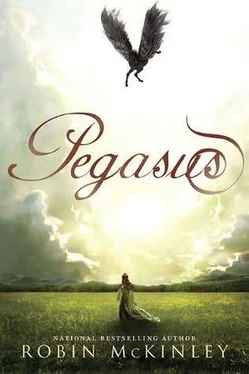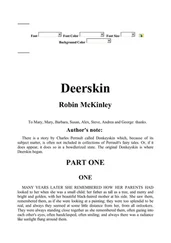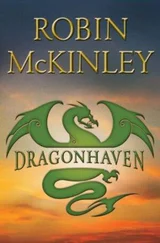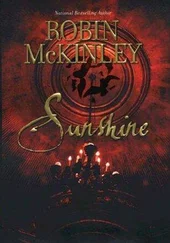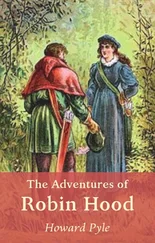Her father had stopped in the gateway, so perhaps he hadn’t noticed her involuntary recoil. Old stories came into her mind and she thought, They sound as if they’re seeing off a war party. She gave a convulsive shiver and her father squeezed her arm against his side and murmured, “Courage, young one; be glad of their enthusiasm. Be glad of all those village fêtes you went to, and all the pony rides Ebon gave the littles, because they’re part of the reason you’re going today—because all these noisy people thought you should.” He lifted his other hand and waved and, after a moment, so did she. The crowd was divided into two parts, and between was a long clear straight path stretching as far as she could see: for the pegasi to gallop down, carrying the draia .
The pegasi came through the arch behind them. Human servants were carrying the already-loaded luggage drai , and they set it down, spreading out and then lifting the loops of rope that went round the pegasi’s necks; but the pegasi themselves, with their tiny feather-hands, fastened and checked what on horses would be cruppers and belly bands: there were two shamans per drai , to ensure that the ooffhaloah worked as it should. The draia for herself and her father lay over the pegasi’s backs; the pegasi slipped them off, where they lay in unrecognisable little huddles on the ground. Even knowing what Ebon had told her about the ooffhaloah , even knowing that the pegasi had to be able to use their wings and their legs freely in flight and therefore the passengers needed to hang below their carriers’ feet—Sylvi had perhaps been betrayed by her forbidden knowledge of flying because she said at once, shocked, when she’d first heard of the prototype human-carrying drai , “But what about landing ?”
Even after almost four years’ practise, she and Ebon didn’t always get it right, and she was lying free on his back with no ropes to complicate the issue. She realised what she’d said and blushed so violently she thought she could feel her hair frizzle in the heat, but several of the humans also present laughed and her father said mildly, “Well spotted, Sylvi.”
Pegasi did carry other things this way, and when they glided down toward landing they leaned against the ropes—their harnesses were asymmetrical to take this odd strain—till they were horizontally taut, to lift the baggage, whatever it was, above ground level, and the carriers said their words to hold it there. It still took a good deal of practise for a team of pegasi to learn to do this reliably and accurately. Their very best teams were carrying the king and his daughter—and there were the six shamans flying with them to strengthen the holding words.
Ebon was one of the six pegasi carrying the princess. How did you manage that? Sylvi had said, very impressed, the evening the names of the carriers—the doorathbaa —were read out.
Ebon, unusually for him, took a few seconds to reply. Well, he said at last. I pleaded and pleaded and pleaded and pleaded and begged and begged and nagged and whined and whinged and so on like that. I really didn’t think I was going to make it. And then I thought I can’t notmake it, so I went on begging and being a pain in the neck and the rear and all four legs and forty wings. They won’t take you unless you’re grown, you see, although I’m bigger than Traa or Maoona. Dad, who never gets cross, said to me once that I could mess up the whole trip if I kept on about it and I thought about that, and about telling you you couldn’t come after all because I’m a . . . a . . . hafwuffab. What do you call someone who is really irritating and stupid?
Fool, dolt, nitwit?
Eah. All of those. But I thought about it some more and I couldn’t not do it. I think even Dad got it finally. That I wasn’t just being . . . I don’t know. But what happened is that Guaffa—he’s the one who—who takes care of the doorathbaa—there’s another word, clafwha, which is being the head of something when you’re not the head of something. You humans don’t seem to do it—your heads head. But Guaffa is the clafwha of the carriers, the doorathbaa. Guaffa cracked, thank wing. I’d been pestering him as much as Dad. He told my dad that if it was okay with him and I could do it he’d have me. And Broraakwha kind of wanted not to do it because his hrmmhr is about to pop with their first baby and he was sure it would happen while he was gone.
So Guaffa took me out with a rope around my neck and his and a beastly great boulder in the drai—I swear it was half a mountain, heavier than you’ll ever be unless you bring some of those stone heads you walk down your wall on in your pockets—but I wasn’t going to fail so I didn’t. I think we flew to the end of the world and back. I was never so tired in my life but I wasn’t going to tell him that. All Guaffa said was “I can see why they call you Stone-Carrier” but he took me. Then I had to learn all this team stuff—and I had to learn it fast. Once they’d taken me, though, there was no more question and they just drilled and drilled me. It’s all tricky but landing’s the worst. Well, landing’s always the worst. I was kind of hoping I’d get some ideas about our landing problems but I didn’t, and I don’t think any of the holding words would do anything, they might make it harder to roll if you fall. I haven’t had any special training for ooffhaloah either. Never mind. I’m third rope on your drai and that’s what matters.
Ebon was kneeling by his rope-loop now. A single pair of human hands could pick up even a thick rope easily, but the pegasi’s alula-hands were too weak. It took two pegasi to lift a rope loop, and the pegasus whose neck the loop was to lie round would kneel as well, to make the effort less. Once the rope was settled, the pegasus would stand while the rest of the harness was fastened and fiddled with till the fit was perfect. They did it so gracefully there seemed no anxiety or hurry to it—no forced allowance for weakness—and they did it quickly. It seemed almost a dance, perhaps a cotillion, or a sort of high-level musical chairs, because all the pegasi who weren’t being or hadn’t yet been fastened into the harness helped with the harnessing, pair and pair, till the last six were harnessed by the six pair who were not carriers.
Although Ebon was the only black, the pegasi were variously coloured, from white to cream to gold to copper-red to dark, fresh-ploughed-loam brown and deep shadow or silver grey, and the three groups that made the three circles, six or eight spokes around each central boss, seemed to be creating some pattern with some meaning beyond the simple fact of preparation for the flight to come. Some . . . Sylvi shook her head; I’m just a little dizzy, she thought. Too many people watching us. Too many people watching the princess who is going to the pegasus country—and the pegasus Caves. How many of them know about the Caves?
Ebon caught her eye. Don’t worry, he said. We’ve got this netted. Tight as silk.
It comes with the breathing, she said. Worrying.
When every particle of harness was secure exactly where it should be, the accompanying pegasi moved away from the carriers. For a moment—as if the purpose of the pattern they had created was about to be revealed—all twenty-two carriers stood motionless, perfectly arranged in their three circles, tails and necks arched, wings only a little roused—and more beautiful than moonlight or summer dawn or the face of your true love. The mutter of excitement and curiosity among the human crowd died away to silence.
And then Guaffa, who was, in the absence of Lrrianay, leader of the pegasi, bowed his neck, stamped one foot, and lashed his tail twice, left, right, and murmured a few words: and Sylvi, without thinking about it, only grateful to understand something, and having spent the last several weeks cramming herself with the pegasus language including everything Ebon told her about the doorathbaa , immediately moved forward to settle herself in her drai , because she knew that was the signal. There was a quick rustling whisper through the crowd, but she didn’t think about that either.
Читать дальше
